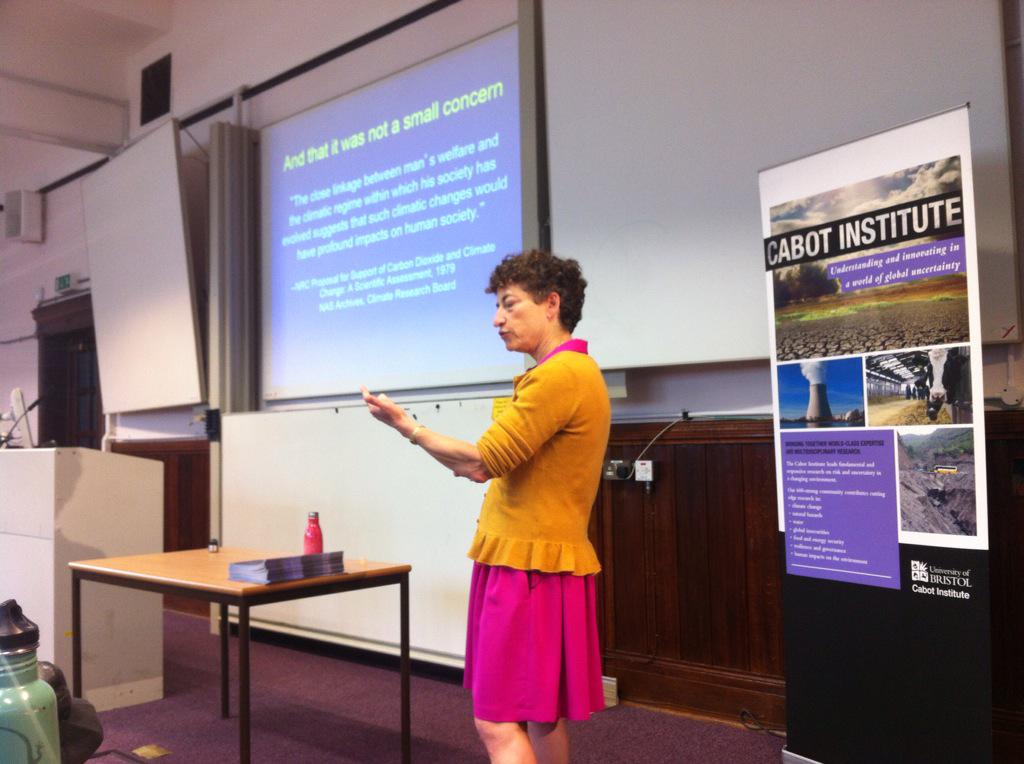 |
| Naomi Oreskes at the Cabot Institute. Image credit: Hayley Shaw. |
With breakthrough science finding and new technologies emerging every day, one major issue for the scientists is to convince the public to embrace the novelties. However, despite more and more effort being put into public engagement, the credibility of science is still staggering. One of the biggest frustrations, surprisingly, comes from some fellow scientists. They deny the existing consensus of the science world and incite doubts in the public minds. Last Thursday, Naomi Oreskes gave a fascinating Cabot Institute/Bristol Festival of Ideas seminar about the agenda of these doubt merchants and their reasoning behind these agendas. This blog highlights key parts of her talk.
In her talk, Naomi took climate change as a key example. Carbon Dioxide (CO2) was established as a greenhouse gas in 1850, and the burning of fossil fuels was proved to be an emitter of CO2 at the beginning of 20th century. In 1965, after years of intensive observation and recording, Keeling demonstrated the constant rising of CO2 in atmosphere and a prediction of global warming was made at the same time. Serious discussions about global warming in 1970s led to a consensus in the National Academy of Science (NAS) of USA which described global warming as a threat and suggested immediate actions to curb the trend. The effect of warming was consequently recorded in 1988, which confirmed the worries of scientists and prompted the creation of Intergovernmental Panel on Climate Change (IPCC).
Since its first report, IPCC has made it clear that global warming is happening, and it is caused by the increase of greenhouse gas in the atmosphere as a result of human activities. In 2004, after analyzing 928 papers published in peer reviewed journals between 1993 and 2003 related to climate change, Naomi found that none of them disagree with IPCC’s conclusion. Nowadays, 72% of Americans believe that global warming is happening and 62% thinks positive interference needs to be taken.
Nevertheless, some American politicians and think tanks still claims that there is no scientific consensus on global warming, and actively campaigns against it. Among all the think tanks denying global warming, George C. Marshall Institute is the most prominent one. Founded by three famous physicists Fred Seitz, Robert Jastrow and Bill Nierenberg, Marshall Institute has played significant roles in stimulating public doubts against scientific findings on issues like ozone layer, acidic rain, DDT, and most importantly, smoking. Seitz, who was affiliated to tobacco company R.J .Reynolds, along with Fred Singer, a rocket scientist who worked for Phillip Morris, voiced their disapproval against FDA’s conclusion which calls second hand smoking a carcinogen. They claimed that there were still space for debate on the tobacco issue and FDA’s finding is inconclusive, and this strategy (“tobacco strategy”) is now used by the same group of people in their lambasting towards EPA on global warming issue.
Besides the obvious economic connection, Naomi argues that the reason for these people to act in such way may be even deeper. After the WWII, Friedrich Hayek and Milton Friedman led the movement of neo-liberalism, argues for free-market and less government control. This ideology was massively popularised in 1980s by UK Prime Minister Margaret Thatcher and US president Ronald Reagan, and was absorbed by the Conservative camp. Under the historical background of Cold War, such ideology becomes more appealing to the Conservatives, as they believe that personal freedom is dependent on economic freedom. With this kind of mind set, Global Warming and Tobacco Control both seem to be conspiracies of socialists who try to tighten the government control on civil liberties, and it will be a slippery slope and eventually morphs the West into Soviet Union.
Ideology impacts stance on climate change @cabotinstitute @FestivalofIdeas pic.twitter.com/KNZI3znxOk
— Hayley Shaw (@TheRiskExchange) June 18, 2015
Knowing the reasoning behind these antagonists, it will be easier to tackle the problem. Of course, as the battlefield is the public opinion, the most fundamental work still lies with science communicators and science public engagements, which shoulders the responsibility to pass on scientific findings into public’s visible range. Besides that, controlling greenhouse gas emission does not always have to be in an anti-free market fashion. The creation of carbon credit and its trade market is a great experiment, which opens a possibility outside sometimes crude legislations. After all, climate change is a burning issue which needs immediate attention and action from the whole of human society. While the debate of climate change is no longer a scientific one, but a political one, it is worth recruiting political wisdom to think beyond the science, and come up with a package of solutions to minimise the obstacle for us to act upon it.
———————————————
This blog was written by Cabot Institute member Dan Lan, a PhD student in the School of Biological Sciences at the University of Bristol.
 |
| Dan Lan |
